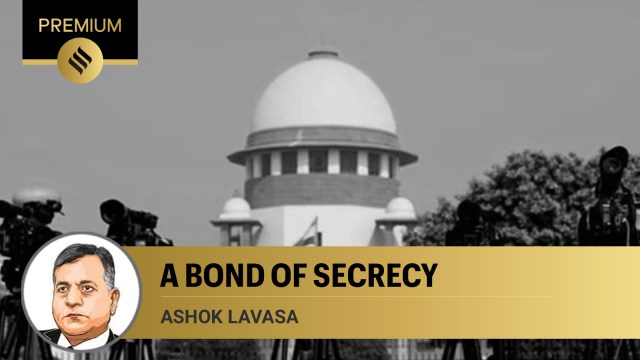
Almost everything in favour of and against the disclosure (or non-disclosure) of funding received via electoral bonds is in the public domain, save the identity of the giver and the receiver, and their bond.
The introduction of the bond as an instrument of political funding per se cannot be questioned but not making the information public has been questioned as being antithetical to the principle of transparency and against the Right to Information (RTI) Act. That political parties have themselves steadfastly resisted being brought into the ambit of the RTI Act despite feeble attempts by statutory bodies, speaks volumes about their commitment. But why should the State seem to collude with political parties in this obfuscation by granting income tax exemption? The Election Commission of India too had consistently argued against electoral bonds till it decided not to oppose the matter for reasons that remain as mysterious as the instrument.
Even in past hearings, the Supreme Court (SC) raised inconvenient questions and appeared to be seeing the point made by the petitioners questioning the merit and intent of this opaque instrument. Instead of sealing the fate of the bond, it ordered the envelopes containing vital information to be sealed. The Court refrained from staying or delegitimising electoral bonds leaving everyone wondering if yet another opportunity to pronounce on a matter of “great pith and moment” was lost in the absence of “the native hue of resolution”.
What the SC does this time is a subject of much anticipation. Will it look into the record of requests for anonymity from potential donors and validate it? Will it see if tax exemption without full disclosure is fair public policy? Can such tax-exempt money be kept forever by the recipient, without spending?
There is merit in the argument that an electoral bond is an authorised instrument that serves as an alternative to cash, but the logic of secrecy is confounding even if there is evidence that such a demand was made. It is baffling that the state should reward secret transactions with tax relief, both for the donor and the beneficiary. Do the tax laws permit tax exemption without disclosing full details of the recipient tax-exempt organisation or the donor claiming tax relief? Further, the general principle of granting tax exemption to any organisation receiving donations is that funds received are utilised for the stated purpose. For example, an organisation set up for assisting the orthopedically challenged would have to show that the “use of proceeds” has been made to fulfil the objectives for which it was established. Similarly, if a political party receives tax-exempt electoral bonds, should it be allowed to retain that amount indefinitely? It must be obliged to spend that amount substantially for election purposes in a given period or lose the benefit of exemption. This would curb the tendency of political parties to become recipients of tax-exempt funds without utilising them.
Redressing this would require a specific provision in the relevant laws by which party accounts are subject to periodic proprietary audits and parties are made to incur tax liability for unutilised funds. This would align the provisions pertaining to political donations with those that apply to tax-exempt donations for other purposes.
Such a reform in tax laws would have to be accompanied by another stipulation specifying limits to expenditure incurred by a political party during an election. There have been suggestions in the past relating to this, including the EC proposing a specific limit. For example, if the limit on candidate expense for a parliament election is, say, Rs 95 lakh, the political party fielding the candidate may be allowed to spend no more than, say 50 per cent, of the expenditure reflected by the candidate in his accounts submitted to EC. This would automatically limit party expenditure during elections. Thus, if a party were to field a hundred candidates during Lok Sabha elections, it would be able to legitimately spend no more than Rs 42.5 crore for campaigning from party funds assuming that all the candidates of that party utilise the entire expenditure ceiling.
If the proposed periodic audit by a CAG-appointed firm conducted every five years were to show that the party has been unable to spend the tax-exempt income it received for the declared purpose, it should be liable to pay income tax on the unutilised portion along with interest. Tax exemption should be treated as a form of state subsidy to political parties and subject to the same principle of utilisation of subsidy as is the case in other schemes funded by the exchequer. No tax exemption should be allowed on electoral bonds if the details are not fully disclosed. If the donor and a political party want to have a bond of anonymous munificence, such contributions and incomes must be fully taxed. When income tax laws insist on full and honest disclosure, why should the electoral bond incentivise secrecy?
This secret “bond” also begs a counterintuitive question: Why is it that in India, people prefer to contribute to the cause of democracy in secret? There are countries in which people proudly and openly claim to provide donations to political parties (like the Political Action Committees in the US), which are vital instruments of a democratic system. After all, democracy is as worthy a cause as climate change, environment protection or looking after the homeless and infirm and an honest citizen would be happy to be associated with such a cause. Isn’t that the principle behind making such contributions eligible for tax exemption? Why are we as a society such that those who fund it want to conceal their contribution and why does our political system support this? Let society introspect while the SC ruminates.
The writer is a former Election Commissioner. This article is an edited excerpt from his essay in the forthcoming book The Great Indian Manthan: State, Statecraft and the Republic